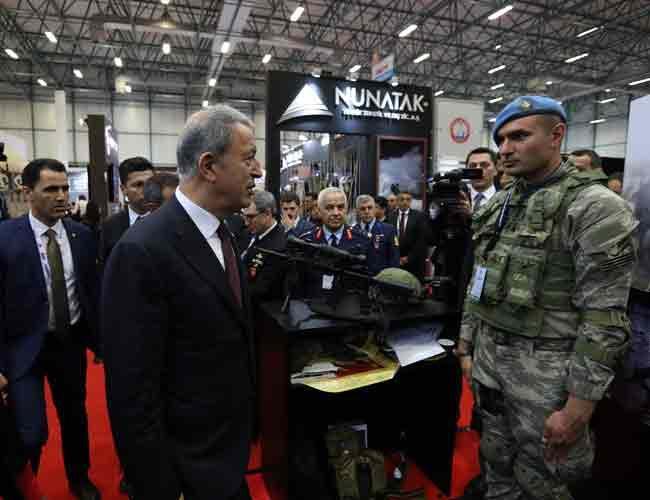
The terms of Turkey’s agreement for participation in the consortium of F-35 fighter jet production does preclude it from procuring Russian made S-400 anti-aircraft missile systems, Defense Minister Hulusi Akar said.
“There is not article in this partnership that ‘you will be expelled from the partnership in case you buy a S-400’,” Akar said in an interview with NTV on May 3, noting that this would not be fair. He pledged that S-400 systems and F-35 fighter jets will not compromise each other.
Akar also that Russia has failed to keep its promise to Turkey about removing YPG members from Tel Rifaat town in Syria, which damages both soldiers of the Turkish army and the civilians of the region because “terrorists open fire from time to time.”
“There are commitments Russians made us for removing the YPG members there. But they have unfortunately not realized this,” he said. “Therefore we see that the terrorists there open fire and give harm to our soldiers, to locals there,” he added.
In 2016, the YPG group captured a number of Tal Rifaat’s northern districts from the Free Syrian Army (FSA), from which it has continued to stage attacks on the FSA-held part of the city. The move was to consolidate their hold over the region between the east bank of the Euphrates River and western Afrin, thus linking all the territories under their control. Turkey assumes the YPG is the Syrian branch of the outlawed PKK.
Tal Rifaat is a strategic town in between the regions of Operation Euphrates Shield in Jarablus and Operation Olive Branch in Afrin.
The Turkish Armed Forces and the Russian Armed Forces on March 26 conducted the first independent but coordinated patrol in the Tal Rifat area in northern Syria.
US closer to Turkey’s views on the safe zone
Akar said that the U.S. and Turkey commenced to have similar approaches to a possible safe zone in northern Syria, and the United States’ attitude has started to become more “flexible.”
Elaborating on the latest talks with James Jeffrey, the U.S. special envoy for Syria, regarding the safe zone, the defense minister said the U.S. is “closer to Turkey’s opinion” that the YPG should be kept out of “34-40 kilometers’” depth in the safe zone.
“We demand that no elements of PKK/YPG be present in 30 to 40 kilometers deep. The U.S. has had a certain approach since the beginning, yet it started to be more flexible. We also pleasantly observe that [the U.S.] has started to have a more similar opinion to ours,” he said.
“I told Mr. Jeffrey that we are drastically losing time, which provides opportunities to terrorists that risks the security of our country, nation and people, and we need to act as soon as possible,” he added.
The defense chief also asserted that both the U.S. and Turkey should take bilateral decisions and precautions “as soon as possible.”
“We did the Euphrates Shield Operation one-sided as Turkey when working together was not possible. I told [Jeffrey] that we do not want to be in this position again,” Akar said.
When asked about the control mechanisms of the safe zone, Akar stressed that Turkey is the only country with sufficient military, administrative and logistical elements to control the area.
“Previously, the U.S. proposed some coalition members, Europe, NATO countries, for deployment of ground troops. No one responded to this offer positively,” he said.
“In this sense, only Turkish Armed Forces and Turkey has the ability to function in this region with availability. Thus, we conveyed to them that we are capable and up for the job,” he added.
Russia ‘ready to cooperate’ to sell Turkey Su-57 fighter jets
